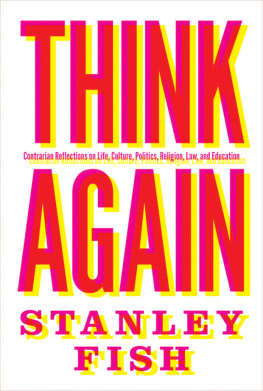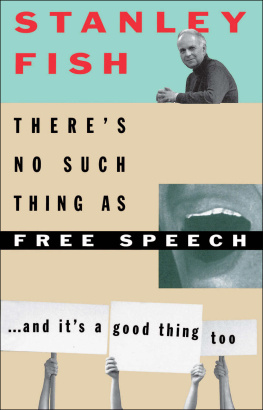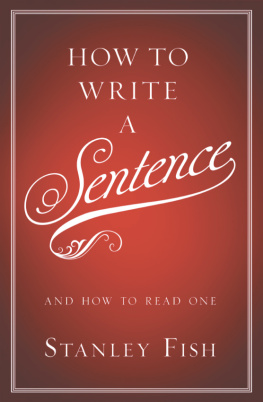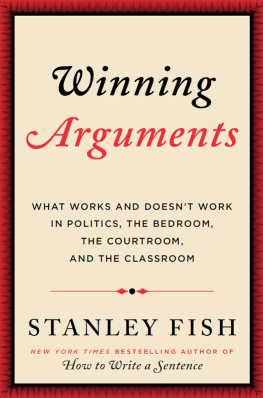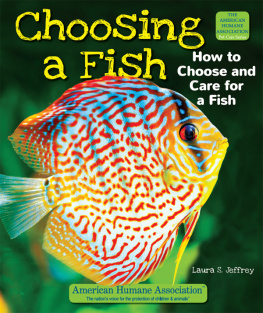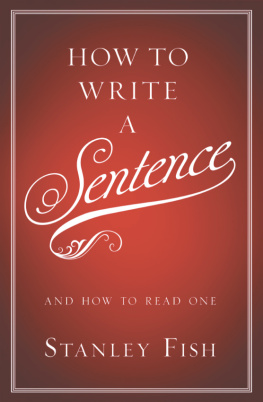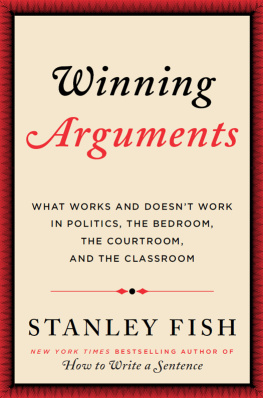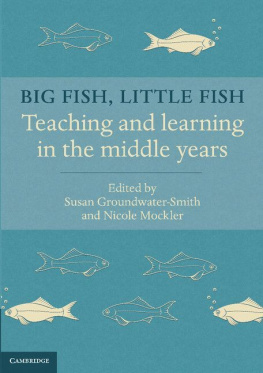
Think Again
THINK AGAIN
Contrarian Reflections on Life, Culture, Politics, Religion, Law, and Education
STANLEY FISH
PRINCETON UNIVERSITY PRESS
Princeton & Oxford
Copyright 2015 by Princeton University Press
Published by Princeton University Press
41 William Street, Princeton, New Jersey 08540
In the United Kingdom: Princeton University Press
6 Oxford Street, Woodstock, Oxfordshire OX20 1TW
press.princeton.edu
Jacket design by Chris Ferrante
All of the essays in this volume, with the exception of the introduction, were originally published by the New York Times.
All Rights Reserved
ISBN 978-0-691-16771-8
British Library Cataloging-in-Publication Data is available
This book has been composed in ITC Cheltenham Std and ITC Franklin Gothic Std
Printed on acid-free paper.
Printed in the United States of America
10 9 8 7 6 5 4 3 2 1
To my brothers, Ron and Peter, and in memory of my sister Rita who was surprised to find that her brother could be funny
CONTENTS
INTRODUCTION
The essays collected here are culled from the three hundred or so columns I wrote for the New York Times from 19952013. The order in which they appear is intended to bring out connections and themes that were perhaps not evident in their serial publication over a long period. One theme, often repeated, is that although the columns were published in the Opinion section of the newspaper, they are not, for the most part, opinion pieces. That is, they are less likely to declare a position on a disputed matter than to anatomize, and perhaps critique, the arguments deployed by opposing constituencies. There are two judgments one might make on a position: (1) the arguments put forward in support of it are weak and incoherent, and (2) it is wrong. These judgments, I contend, are logically independent of each other: it is quite possible that you could find the case being made for a position unpersuasive and still be persuaded of its rightness. Well, yes, you would be saying, I think those guys have it right, but the reasons they give for their conclusion (with which I agree) are contradictory and dont hold together. And conversely, you might be impressed by the elegance of the reasons put forward in defense of a point of view you nevertheless reject; you would be saying, yes, they have the better of it if the measure is logical cogency, but nevertheless, theyre wrong.
Because I separate these two kinds of judgmentformal and substantivea reader of these columns will often not know where I stand on the issue being discussed. The fact, for example, that I excoriate and ridicule the reasoning of professional atheists Richard Dawkins, Christopher Hitchens, and Sam Harris does not mean that I am myself a theist; it just means that I find their arguments slipshod and even silly. I might well be of their mind at bottom and still think that they are poor advocates for the conviction we share. Many readers found my refusal to lay my substantive cards on the table infuriating and agreed with Larry, who sent in this comment on November 2, 2010: Could you do us all a favor and state in a simple declaration what you believe, because, man, youre killing me.
Sorry, Larry, thats not what I am doing in these columns. If what you want are opinions and protestations of belief, there are plenty of places to find them, but not here. This is not to say that I make no strong assertions; only that what I assert doesnt take the form affirmative action is right or affirmative action is wrong but rather, the form this particular argument (for or against) doesnt prove what it claims to prove. After Im done with saying that, the substantive issue remains unaddressed, or at least unresolved, and my readers are no more in the know about where I come down than they were at the beginning. One might say, then, that although I am writing in plain sight, Im in hiding.
But not always. A number of columns are autobiographical and even confessional. A selection of these is presented in (Personal Reflections) of this collection. There readers will learn about my anxieties, my aspirations, my eccentricities, my foibles, my father, and my obsessionsFrank Sinatra, Ted Williams, basketball, and Jews. What links the columns, even when their subject matter is disparate, is a relentless internality, a tendency to live in my head, a preference for activities that are absorptive, an affinity for enclosures and closure, and a fear of anything new and open.
In for critics of both actors to linger on their impressive surfaces and fail to see the sensitivity and inward fragility that marked their best performances.
In ) is that there are no such procedures and that the talismanic values that supposedly accompany themfairness, objectivity, neutralityare either empty or filled with the substantive claims they supposedly exclude. The world of liberal abstractions has efficacy and relevance in the pages of theorists like John Rawls, but in the everyday world of local choices and decisions, one acts on the basis of what one believes and desires. There is no road from the precepts of high philosophy to the solution of any real-world problem. Your account of truth or evidence may be right or it may be wrong, but whichever it is, it will not generate recipes for action.
This is what I mean when I declare that philosophy doesnt matter, and this is also the lesson deconstructive or postmodernist thought (otherwise known as French Theory) preaches when it debunks the idea of a master narrative from the vantage point of which undoubted facts and universally compelling values come clearly into view. That promise, forever renewed and forever unredeemed, has recently taken a new form in the digital computer: the limitations that attend the partial perspective inhabited by all mortal men can be overcome, we are told, if we harness ourselves to an engine that knows no perspective and delivers undistorted (because unselected) data. The problem is that data randomly gatheredgathered, that is, under the impetus of no purpose or point except to have moreremains inert, and the addition to it of purpose or point will always be arbitrary. A computer (like IBMs Watson) can count things and perform calculations on what it counts, and even reach conclusions about what does and does not match, but it cannot produce meaning; that is the province of human beings who begin with (and within) purposes and reach conclusions not on the basis of impartial evidenceevidence that sits, unsituated, in an abstract spacebut on the basis of commitments and beliefs already in place and internalized.
That is why double standards are inevitable and right, and why favoritism is good and moral: double standards are invoked when you prefer the beliefs you hold to the beliefs others hold and distribute rewards accordingly; favoritism occurs when you are loyal to those who are loyal to you because they share the same values, which are local, not universal. The alternative is to award your loyalty by consulting an independent measure unattached to anyones preferences. My message in these columns is that there is no such measure.
This might sound like relativism, but its the reverse. Its standing up for your commitments and for your comrades rather than standing up for a principle no one has seen and whose shape is always in dispute. Its politics, and that is the theme of (Reflections on Politics). The rap against politics has always been that its judgments are partial; to label a decision political is to say that it is suspect because it proceeds not from an overarching and universal principle but from a local calculation of interest. Its all spin, is the complaint. But the complaint has force only if there is an alternative to spin, if one could persuade simply by sticking to the facts as they exist apart from any particular point of view that might distort them. But facts are known
Next page
